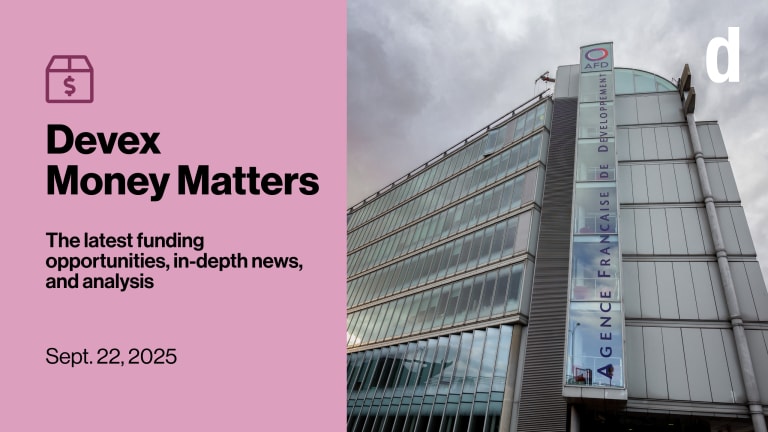
BRUSSELS — France remains unconvinced by plans to streamline the European Union’s aid spending, its secretary of state for development has told Devex.
Jean-Baptiste Lemoyne said France is “reticent” about the European Commission’s idea for a single budget tool to cover the EU’s work outside its borders for the period 2021-2027. Brussels proposed the idea last year to combine the different EU funding streams currently dedicated to issues such as human rights, development cooperation, and supporting countries neighboring the EU.
“France … wants to ... make sure there can be a debate about how funds are used because we have a certain number of priorities we would like to affirm — to orient credit toward least-developed countries.”
— Jean-Baptiste Lemoyne, French development secretaryBut Lemoyne said his government was worried that the plan would allow development priorities to be sidelined.
“We were afraid that certain things that seemed to us like priorities were perhaps not well enough recognized [in the commission’s proposal],” Lemoyne said, speaking in French. “We want to assure ourselves that faced with the urgent needs of the least-advanced countries [and the] urgent need on climate, the funds can be directed toward these kinds of priorities.”
NGOs and members of the European Parliament have also raised concerns that a single funding stream could lead to money being diverted to short-term political priorities, such as halting migration, rather than long-term development objectives. “We work a lot with civil society organizations and often we find ourselves in agreement,” Lemoyne said.
A spokesperson for the commission said at least 25 percent of its international budget would go to climate objectives, although parliament wants this raised to 45 percent. As for least-developed countries, the commission plan represents a 23 percent increase in funds for sub-Saharan Africa to €32 billion ($35.9 billion) over the seven-year period, the spokesperson said, adding that “this amount is fully ring-fenced and could be only increased.”
As part of its proposal, the commission wants to see the €30.5 billion European Development Fund, which EU member states currently pay into separately, incorporated into the EU budget. Last week, the European Parliament called for the proposed single budget tool — the Neighbourhood, Development and International Cooperation Instrument — to be increased to €93.15 billion, but mostly did not contest plans to budgetize EDF, something deputies have long called for to better scrutinize aid spending.
“We had internal debates as well on this question [of budgetizing EDF],” Lemoyne said. “France, naturally, wants to continue to make sure there can be a debate about how funds are used because we have a certain number of priorities we would like to affirm — to orient credit toward least-developed countries, the poorest countries.”
French President Emmanuel Macron wants to spend 0.55 percent of gross national income on official development assistance by the end of his mandate in 2022, up from 0.38 percent in 2016, with a focus on 19 priority countries in Africa.
At EU level, attention now turns to member states in the Council of the EU — and perhaps national leaders later in the year — to decide their position on NDICI and EDF.
A council document from last year summarizing member states’ views, seen by Devex, listed nine of the EU’s 28 countries as opposed to budgetizing EDF. “Denmark, Ireland, the Netherlands and Portugal considered that the current proposition gave enough assurances of the ring-fencing of funds for the [EU] neighbourhood and Africa,” the summary read. “On the contrary, Belgium, France, Italy and the UK considered that more assurances were needed.”
Frank Engel, a center-right member of the European Parliament from Luxembourg, told a plenary debate in the French city of Strasbourg last week that despite France and others’ opposition, having EDF inside the budget was critical to the idea of a single funding tool for external spending.
“We want the [member states] to get on board,” Engel added, “rather than remaining closed off in their somewhat postcolonial attitude when it comes to the nonbudgetization of the EDF.”
Most funds under EDF go to the African, Caribbean, and Pacific group of states, or ACP, a result of these countries’ history as former European colonies. ACP and the EU are now renegotiating the accord governing their relationship and Lemoyne said: “We want the Africa pillar to be strong.”
According to a French government readout of Lemoyne and foreign minister Jean-Yves Le Drian’s meeting with EU development commissioner Neven Mimica in Paris in February, the pair “reaffirmed France’s expectations with respect to the governance of [NDICI], within which states must be able to exercise influence in terms of defining strategic directions as well as with respect to their implementation.”
But Charles Goerens, a liberal member of the European Parliament from Luxembourg, told Devex, “development policy is a common EU policy. That means priorities are defined by the commission and monitored/scrutinized by the European Parliament.”








